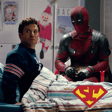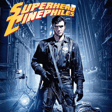Become a Creator today!Start creating today - Share your story with the world!
Start for free
00:00:00
00:00:01

SCP Classic – Superhero Politics
It's election season! In honor of the increasingly politicized environment, this is a good chance to revisit Perry's discussion of superheroes and politics with superhero author and political scientist, Van Allen Plexico!
Want to tell us what you think? Have any questions or comments for Perry about superheroes in media or comics? Leave a voice message to play on the show. You can also apply to be a guest on the show.
Facebook
Bluesky
Threads
Instagram
Contact
Superhero Cinephiles is produced with the support of Zencastr. If you’re interested in starting a podcast of your own, Zencastr provides a whole host of features at no cost, with optional features available for those on a budget. Start your own podcast today with Zencastr!
Recommended
Transcript
Introduction to Audible and Audiobooks
00:00:00
Speaker
Hey, fellow superhero cenophiles. Did you know that almost 30% of adults say they haven't read a book in the past year? Primary reason why is a lack of time. Well, Audible's here to help with the gift of found time. Thanks to Audible, you can listen to audiobooks like Marvel Comics, The Untold Story, or Slugfest inside the epic 50-year battle between Marvel and DC.
00:00:19
Speaker
Read up on the history of superheroes in comics and movies with Grant Morrison's Supergods. You can also check out Vanguard, my original superhero novel series, or try The Vrilagenda or The Adventures of Fortune McCall, both of which were written by our duly departed host emeritus, Derek Ferguson.
00:00:35
Speaker
Whatever you're looking for, Audible has thousands of titles that you can consume while commuting, exercising, cooking, or just relaxing at home.
Audible Free Trial Offer
00:00:42
Speaker
And not only audiobooks, an Audible membership also gives you access to tons of content like podcasts, theatrical performances, and exclusive Audible originals that you won't find anywhere else. To give you a taste of what you can get, Audible is partnered with this show to provide listeners with a free 30-day trial.
00:00:59
Speaker
All you have to do is go to audibletrial.com slash SuperCinemapod and with your free trial you get one free audiobook and two free Audible Originals. In fact, you get to keep those titles even if you cancel before the trial is over. So what are you waiting for? Head on over to audibletrial.com slash SuperCinemapod and start your free trial today.
00:01:34
Speaker
Welcome to the Superhero Cinephiles podcast. I'm your host, Perry Constantine. We got a very special episode today. A while back, those who have been listening to the show for a long time know that um way back in the early episodes, Derek and I had talked about doing an episode about superheroes and politics, which we never actually got around to doing,
Superheroes and Politics with Derek Ferguson
00:01:56
Speaker
unfortunately. And ah since his passing, obviously, we won't be able to do it. but in light of some recent events in the news that have happened, I thought, this is a really good time. This is a really topical thing to to talk about. And I could think of nobody better than my guest today. And that is, he's a political scientist as well as a superhero expert and a fellow podcaster, an author, and that is Van Allen Blexko. Van, how are you doing today? Hey, Perry, I'm really happy to join you today. Thank you.
00:02:28
Speaker
Oh, glad to have you on. ah So before we jump into it, why don't you take a few minutes, tell people about yourself. um I am a political science and history professor at Southwestern Illinois in Southwestern Illinois. And um so I've done that for of ordain almost 30 years now. And I write cult novels, superheroes, particularly the the nine volume sentinels superhero novel series that started back in 2005. And, five and um and I write a lot of other stuff to science fiction and fantasy and um
00:03:08
Speaker
And I also ah am the publisher of White Rocket Entertainment, which we do podcasts, videos, books, comics, got a got a Pulsar, Sentinel's comic, obviously, that you were involved in coming out yeah very soon. Really excited about that. and And just a whole bunch of stuff like that. So I do a lot of stuff. Yeah, yeah, it was a lot of fun working on that, doing the lettering on that.
00:03:28
Speaker
and also the the Cold Lightning comic as well, which you've been working on. um But anyway, today, the the reason we're we brought you on is to kind of merge these two wolves worlds together of of superheroes and politics because I know when I first approached you about this, you hadn't seen the news. I'm not sure how if you caught up on it since, but there's this whole kerfluffle because You know what it usually is, it's anytime there's a slow news day or something, Fox News looks at what's going on in comic books and decides to throw
Controversy: 'United States of Captain America'
00:04:02
Speaker
a hissy fit about it. And this one was about the the United States of Captain America, which is a ah new series Marvel has launched. And in the series, ah Steve Rogers is kind of going across the country and he's meeting all these different people who are kind of taking up the mantle of Captain America, coming from different walks of life and all that.
00:04:24
Speaker
And the series opens with Steve kind of questioning his role as Captain America and saying that, you know, the American dream, it's it's an ideal. But, you know, for a lot of people, for a lot of communities, if it's it can easily become a nightmare or it doesn't exist whatsoever. And that pissed off Fox News or, you know, they pretended to be pissed off about it. And so then they brought on Dean Cain of all people to talk about it because Because he played Superman. He played a very bad Superman several years ago And so they thought he's a comic book expert um Which ironically enough later he mentioned on Twitter when someone called him out about the comic books So I haven't read the comic book, but I stand by what I said yeah There's a shock. Yeah. Yeah so yeah now that doesn't surprise me at all though and their thing is to
00:05:20
Speaker
Their thing is to say the country is not, if the country's going to hell, everything is bad and dark and scary, and it's because we're not being like it was in the 1950s. So if anything is moving forward and not being like the 1950s, it's therefore bad, and we have to change it back, and that's just their attitude. and so of course if ka i mean But America is supposed to is supposed to reflect America. When we're in World War II and we're having to fight physically against the Nazis, he's punching Hitler. If it's the 1970s and there's you know things like the Klan and and and and there's Watergate and all, then then his job is to react to that as he did. and so
00:06:06
Speaker
It doesn't surprise me at all that in an age where we are concerned about the plight of of the poor and minorities, and are they getting a fair shake in the in the in our society, that his job is to reflect those concerns in a comic bookie way, and that's 100% That's how it's always been. Well, Captain America is a ah really good place to start because obviously that's what launched this whole latest um latest hissy fit and and also going back to what a lot of people don't realize is when they look back at Captain America and they that famous cover of him
00:06:42
Speaker
punching Hitler and Captain America Comics number one. A lot of people, in hindsight, they have this impression that, oh, well that was wartime propaganda. But the thing is, that issue actually came out before America even entered the war. Yeah, I mean, that's... ah Well, there's a lot to unpack there, honestly, but I mean, yeah, there were, well, yeah I think a good place to start is like the recent HBO series, ah The Plot Against America. Oh, I just watched that fairly recently, yeah.
00:07:17
Speaker
Yeah, it does a good job of showing the America First movement was really a bunch of, you know, very like anti-Semitic pro-Nazi sympathizer things. And um just because you call yourself America First doesn't mean that you really have all of America that you're putting first, you know.
00:07:35
Speaker
It's ah any any more than than the Nazis calling themselves national socialists meant they were socialists. you know i mean Exactly. These names are very useful, but they aren't always the truth. you know so yeah i mean I think that reflects that there were quite a few Americans who felt like we did need to do something about the rise of fascism in Europe and and its corresponding rise here to a certain degree.
Comic Books as Editorials
00:07:56
Speaker
and and and That was an editorial view. i mean you know that that wasn't an I mean, you make a good point that it it wasn't an action shot from a current
00:08:07
Speaker
news story, it was an editorial viewpoint of where they wanted things to go. Yeah, which is a totally different thing. Yeah, because you remember, it's, you know, Joe, so Joe Simon and Jack Kirby, they're these working class Jewish kids. Exactly. You know, yeah they came from, they came from very impoverished backgrounds. Also, you know, Siegel and Shuster with Superman as well, early Superman comics,
00:08:32
Speaker
It was all about, um you know, those early Superman comics, he wasn't fighting Brainiac and Doomsday and Darkseid and all that. He was fighting slumlords.
00:08:46
Speaker
there I had the um ah had the author of of The Chowderhead Chronicles on my show recently. it's so it's a It's basically Ready Player One for comics geeks. Oh, nice. And there's this cool scene where um all these like white Aryan pro-Hitler guys are picketing in front of Marvel. And that actually happened. Yeah. And I was talking to him about it, and he said that they They were, um they like called up to the Marvel offices and were demanding to see Jack Kirby or something. And Jack says, I'll be right down. When he got down there, they were gone. Yeah, want he farted jack so yeah they were. Yeah, Jack had, Jack had no qualms about ah punching Nazis. Like that was his thing. That was why he enlisted in the army in the first place. And
00:09:35
Speaker
One of his most famous quotes is, the only politics I ever had was if somebody liked Hitler, I'd beat the stuffing out of him and that was that. How was that? Yeah. Well, he was Ben Grimm. I mean, that's who Jack Kirby was. He was Ben Grimm. Yeah. He was, he was exact. Yeah. Ben Grimm was such Jack Kirby wish fulfillment. It was, that was, that was him right down to the cigar and Yancy Street and all that. That was, and him being Jewish as well. Like a lot of people don't realize, forget about that, about Ben Grimm is that he is a Jewish character and that all comes from Kirby.
00:10:07
Speaker
So much so that but when um when the thing died and in Mark Wade and Michael Ringo's run on Fantastic Four, and the rest of the team went to heaven to get them, God was drawn as Jack Kirby. I haven't read that one, but that totally makes sense. Yeah, I love it. yeah it was called um I think it was called The Hereafter, was the name of the story arc. um It was during ah Mark Wade and Michael Ringo's run back in the early 2000s, if I'm not mistaken. I had to check that out. That sounds cool.
00:10:35
Speaker
um And yeah, and going back to the plot against America and the America First Movement, and there's a book, you may know about this. i haven't I haven't read it myself, but I've heard a lot about it from the Behind the Bastards podcast, which also does a lot of talk about fascism and all that. And it's called ah Hitler's American Friends. And it talked about the America First Movement and Charles Lindbergh. And ah people don't realize that there was actually ah a fascist you know demonstration, a fascist you know gathering at Madison Square Garden of all places. Yeah, yeah. and And I always have to explain to my students, because I'm here near St. Louis, and everything around here is still named Lindbergh. But I always tell them, this is the only place pretty much in the country that that's still the case, because 80, 90 years ago, stuff all over the country was named Lindbergh, and then they all got rid of it.
00:11:34
Speaker
except for St. Louis because of the spirit of St. Louis and all that. That's the only reason. So, yeah, people don't realize that, you know, because he was the, there's a um um ah ah bri a Bill Bryson book um called One Summer, 1927 that talks a lot about Lindbergh, and and I had never thought of it this way, but Lindbergh was bigger a bigger superhero than any superhero there's ever been in that moment. If you went back to 1927, 28, 29,
00:12:04
Speaker
He was the biggest hero that there had ever been and probably ever will be in the entire planet because prior to that, the whole planet couldn't know about something all at the same time. right After that, there's too much.
00:12:19
Speaker
But he came along at just that moment when everybody could know about something happening in the news, and yet there wasn't a flood of you know five new people every day that are a hero or something. and so he was you know To quote the Beatles, he was bigger than Jesus for like three years because he was the only global celebrity.
00:12:40
Speaker
and basically. And so when it came out that he was such a, you know, Nazi sympathizer and pro prohibit and everything, it was a ah real shock to much of America and his reputation, you know, slid and slid. There was already there was sympathy to over the the the kidnapping of the baby and everything. And so there's a whole lot there. That's quite a story of of highs and lows and good and evil. And it's I mean, it's as it's as big as any big superhero you know comic story. There ought to do something like that.
00:13:08
Speaker
Well, I'm glad you mentioned ah the plot against America, because um I hadn't even thought about that for this episode. But having just watched it, I think like maybe last month, um because, you know, i'm I never really knew much about Limburg, you know, over the course of my life, you know, it's Um, because like you said, like the, the fascist sympathies and all that, like his, his role in history has been downplayed a lot. And yeah one of the things that, uh, plot against America did really well was illustrate just how big of a, of a celebrity he was at that time. Yeah. Yeah. He could have got elected president, I think for sure. And, um, and, um,
00:13:49
Speaker
And it would have been very bad for a whole lot of people. And I thought another interesting, I don't want to spoil too much of that show if people want to watch it, but one, I'll be very vague here. One thing that that show did that I thought was very effective was that they showed how He could enable a movement without being 100% evil into it himself. right He wasn't American Hitler. He was just an American Hitler enabler. There were worse people than him, and that kind of becomes obvious over the course of the show. But because he was so popular,
00:14:24
Speaker
He opened the door for much worse, which in some ways is just as bad. Right. Right. Well, you see the same kind of thing with um what's happening now in America, too, with with Donald Trump. And but before Donald Trump, you know, you had you had George W. Bush and and Carl Rove and all that and and contributing slowly, like this whole death by a thousand paper cuts type of thing.
00:14:48
Speaker
Yeah, it did it's you know turning up the heat slowly rather than all at once so that it shocks everybody. you you you know I mean, that's the you know there's another great example of of how this kind of thing slowly creeps in. If you've seen Babylon 5, they do a great job on there of covering over the course of five seasons the slow rise of fascism within a democratically elected government. And it you know it's like in in one season,
00:15:16
Speaker
there's like an assassination. And then another season, ah oh, well, they've they declared martial law, but for for for reasons of there's violence, they had to, you know. Right. And in the third season, well, we're going to keep the martial law. And now we're going to have we're going to have this organization with armbands that goes around and checks on everybody, but just for your own safety, you know, and it just more and more until ultimately you have to actually do something about it. So, yeah, that's another really good portrayal with Swazinski.
00:15:44
Speaker
ill to I'll have to check that out because it's it's on HBO Max now. so Oh, yeah. I've been meaning to watch that after hearing people like you talking about it for for years now. And Andy Fix and I are doing a biweekly review of the series as it goes along. So check that out. Nice. that' nice and um And also, that because that's what happened in in Nazi Germany, too. like It wasn't just an overnight thing. And like people looking at it in retrospect, they think it's like, oh, well, you know,
00:16:12
Speaker
you know hitler came't Hitler took over and then it was the Holocaust and like, well, no, the it was slowly over time. And there's a reason the Holocaust was called the final solution. It's because they had done a lot of other stuff before that.
00:16:24
Speaker
Absolutely. Yeah, I know. Yeah. you um Because you have to understand that the German population, just like the American people, are for the most part educated and intelligent and culturally advanced people. you know I've always said that you know before World War II, there's an argument that Germany was one of the four or five most educated, advanced, progressive people on earth in some ways, which is all the more shocking, that they could fall for Hitler. But on the other hand, it's a great cautionary tale that anybody can fall for the Pied Piper with the message that that is appealing in a particular, you know, we're not immune to it. I mean, we just saw in our most recent election that, you know, while 80, whatever million people apparently have common sense,
00:17:11
Speaker
70-something million are like, oh, give me more fascism. That sounds good. Yeah. no Well, and yeah. And um that was one of the things, and I'm glad you mentioned that too, about pre-World War II Germany, because that was something else I've started to find out more about in the past year or so was about what the Weimar Republic was like and just
American vs. European Political Spectrum
00:17:29
Speaker
how progressive it was. Like, they even were talking about trans rights back then. I mean, that's something that in America didn't even come up until the past, that you know you know, five years or so.
00:17:39
Speaker
Sure. Yeah, now they, um well, the the the big problem there is that Europe has always had a much broader political spectrum. I mean, if you if you if you give me just a second to to get turned into political science mode. No, absolutely. Go right ahead.
00:17:56
Speaker
In the United States, the the global political spectrum, you have the far, far left, which is communism, the far, far right is fascism. The United States is kind of dead center. We're like right in the middle. And our Democrats are a little left of center, our Republicans a little right of center, depending on the year, depending on the person, depending on the party. right um Though that's not always been the case because, as I always point out, only in the last 40 years has ideology been the main dividing factor between the parties.
00:18:23
Speaker
forty More than 40 years ago, there was geography, there was slavery, there was a lot of other stuff. In the last 40 years, it's been, idiot because you used to have conservative Democrats like George Wallace and liberal Republicans like Nelson Rockefeller. So there's been, if this is new, okay, people think this is how it's always been, this is new. So America is like a small segment of that very broad um ideological spectrum.
00:18:47
Speaker
we don't have very much beyond our narrow borders on each side. there's not a lot of real i mean We you know talk about it, but there's not a lot of real communists running around here. and There's not a lot of real fascists, although I'm getting concerned. But in Europe, there's always been a lot on every inch of that spectrum. yeah And so in in the Weimar Republic in Germany,
00:19:11
Speaker
um you know Again, if you if you can picture the ideological views of America as like a triangle, like a peak with most in the middle. Europe was more like a V with most on the ends. you know There weren't a lot of moderates. There weren't a lot of centrists. You were either with the communists or you were with the fascists. And what Hitler did in the 30s was go to the really rich, powerful German industrialists and say, look, my side can win or their side can win. If my side wins, you get big government contracts. If their side wins, they
00:19:47
Speaker
execute you and redistribute your stuff to the people. So do you want fascism or do you want communism? And given a choice of those are the only two options, people took the fascism, which I can kind of understand if I'm a rich guy sitting on a pile of money and have a factory and I know that I can either keep running it for evil or it goes away entirely and I'm dead, as a chance I might keep running it for evil, you know. Right. And I believe something also similar happened in Italy, too, with Mussolini, if I'm not mistaken.
00:20:16
Speaker
Yeah, exactly. Yeah, because communism makes such a great boogeyman that you say it's that or me. I mean, that's what Trump did, right? He said, it's me or socialism. And socialism is communism in Venezuela, boom. Yeah, yeah. I just but i was actually just watching um right before we recorded, just just by chance, I happened to be watching the original Manchurian candidate. and you know, um same exact thing. Like, you know, um you know, Iceland is doing all that build up about, you know, the communist threat and all that, which is very much influenced by but what McCarthy had actually done in America at that time. Oh, yeah. Great movie. Yeah. i felt it was Amazing. Yeah.
00:20:54
Speaker
My political theory classes, I would show it because it really shows how I mean, I mean, I think even more instructive than the than the like the a plot in that movie, which is the guy that's been brainwashed and to serve the the communist. You know, while it does criticize the communist, it also criticized the other side because you've got that McCarthy figure.
00:21:14
Speaker
who just keeps pulling numbers out of his rear end, you know, of ah there's, you know, Heinz 57, 57 communists. you know So it it it does a really good job of kind of exposing both of the extremes as being, you know, too extreme, I think. Well, yeah, it's that whole, and I know it's it's problematic in some ways, but that whole horseshoe.
00:21:37
Speaker
analogy of political ideologies, where the further you wait, where you get from the center, eventually, they kind of start acting like each other. Yeah, because it I and what, what you're referring to, I use a diamond chart. And but because what it does is it has the bottom quad, well, there's five, there's five sections, but the bottom section of that diamond,
00:22:01
Speaker
is um authoritarianism, just dictatorship of some kind. On the left side of that section is left-leaning dictatorship, which is communism. On the right side is right-leaning dictatorship, which is fascism. One gives you a little more control over your money, but less over your life. The other gives you a little more control over your life, but less over your money. And so they're both down there in the dictatorship section. They're just different kinds of dictatorship. right And if you go the opposite to the vertical opposite, you have anarchy and libertarianism is just kind of. Right. Well, which is another interesting thing because I took one of those those political ideology tests type things they have. And it classified me as um a libertarian socialist, was how i which which seems like a contradiction, but the way you're describing it actually makes sense.
00:22:53
Speaker
Yeah. Yeah. I'm trying to, I guess that would be higher up, but you're, you're away from dictatorship, but with a little more of the government regulating. Exactly. Yeah. Yeah. Yeah. Sure. Yeah. So yeah. Um, and, uh, so, um, and Japan's kind of like that too, uh, as far as the political ideologies with Europe, because it's very much the same parliamentary system because the oldest political party in Japan is the Japan communist party. And, um,
00:23:19
Speaker
Although they're not technically a communist party, they're actually a democratic socialist party, but they still keep the name. because And that all goes back to stuff that happened in the 1950s and the 1960s. That was when you had a lot of um militant ah left-leaning groups in Japan come out. so that And there were some that argue that um allied with ah the PLO.
00:23:44
Speaker
and And so there's a whole bunch of history there. In fact, there's um if anyone's interested in this, there's ah there's a podcast called Against Japanism, which kind of goes into a lot of this history as well.
00:23:55
Speaker
Interesting. Yeah, yeah. And so taking it back to to superheroes, um what are some of the biggest examples? Obviously, Captain America, right? Captain America has always been political. I mean, when people talk about, oh, I wish comic books weren't so political, and but Captain America has always been rooted in politics. Like even in the 1940s, it was all about, you know, fighting against fascism.
00:24:19
Speaker
And in the 1950s, during the Red Scare, it was all, you know, you had the anti-communist stuff. And then you had, ah you had these pockets where he wasn't political, like, you know, Jack Kirby was coming in and doing his, his weird sci-fi stuff. But most of the time, especially when people think about the best cap stories, they're all rooted in politics at the time.
00:24:39
Speaker
Yeah, everything from ah Nomad to this to Civil War is all about dealing with the government and how the government wants to treat a people or treat superheroes. i mean I love the idea that at one point um the the great masked supervillain was revealed to be Nixon. yeah waterate Imagine today if they did a story and they pulled a mask off of the hate monger or something and it was Donald Trump. People would lose, it would it would be a nuclear explosion on Fox and yet it would be just a retread of the same story they did 30, 40 years ago. yeah that's what That's what really amazes me about this when people say that it
00:25:20
Speaker
the comic books have gotten too political. I'm like, they haven't even gotten close to what Engelhardt did during the time. oh No, what's changed is two things, media and social media. That's what have changed because the media have changed in that There wasn't a media structure in the 1970s looking to capitalize off anything in popular culture that they could use to to stir up stir the pot. right ah Today we have media organizations who micro microscopically search through everything constantly looking to to generate outrage.
00:25:56
Speaker
Yeah. And then number two, we didn't have the social media where you and I and everybody else can then go in and weigh in with our own informed or uninformed opinions about it. And so, you know, I just I've always said if if Watergate happened today, Nixon would would have still been president. He wouldn't have resigned because there would have been a media ah machine to excuse him and and a social media machine to let people reinforce their opinions with each other that, oh, his's he's fine. It's OK. He didn't do anything wrong. you know right so i mean that was That was the whole reason Roger Ailes had this dream of creating Fox News in the first place. It was all about because like he wanted this media infrastructure that would have protected Nixon. And Geraldo Rivera even gave away the game a few years ago when he was on Hannity and told Hannity, you know if you were around during Watergate, you know nobody Nixon would have gotten off.
00:26:47
Speaker
Yep. Oh, a hundred percent. Yeah, yeah. And um so that's Captain America for sure. And I mean, what did Cap do half the time was fight like the serpent society, the which was basically the Marvel's clan, you know? Right. I mean, um and then there's Iron Man who his entire existence was, here's the capitalist, um rich, industrialist guy who is who has gotten rich and powerful off of war machine off of literally war machines off of weapons and all the movies kind of touched on that but they kind of very quickly moved on to okay he's seen the light he's a hero i guess the comics did too but i've always thought that what's interesting about iron man if you as opposed to immediately making him a superhero that goes out and tries to ah redress things if if iron man if the first iron man movie had been like a 12 episode netflix series the first seven episodes would have still been him doing bad stuff Yeah. Yeah. And then he would be learning slowly. It would be about his transformation from a, you know, and a ruthless industrialist who doesn't care that poor kids are getting blown up by his bombs and stuff. And that's a very political thing because there are people that think superheroes are supposed to just be black and white or four color, you know, and and don't change and are just there to beat up the the bad guys. but But I guess that also, by the way,
00:28:11
Speaker
raises the question of who who and what are the villains? Because if I think that the way Fox News and some of their supporters see it is the villain is very obviously somebody in the black hat who does things they don't like. But I think that a lot of the stuff that needs beating up, quote unquote, by the heroes is is stuff like social injustice and racism and discrimination. And that's kind of what Marvel has always done is said there's other kinds of villainy that needs beating up, you know, metaphorically besides just the guy robbing the bank or something. Right. Well, that I mean, that was the whole thing behind the X-Men. I mean, it was... Yeah. I mean, well, Sam and Jack, you know, yeah to be fair, there they just use it as a very loose pretext when those early issues. But when Claremont came around, I mean, he dove full into that that um civil rights metaphor.
00:29:02
Speaker
And run and you know i was I was doing an Instagram post about this and one of the images that i that I posted up was the very famous image of William Stryker from God Loves Man Kills pointing at Nightcrawler and like you dare call that thing human. And you know i mean and that was such a ah haunting comment because you know right in the beginning you have these mutant kids being lynched literally lynched from ah swing sets, if I'm not mistaken, and having you know the signed muti on their posts on their chests. Yeah, the X-Men has always been where they would go for the
00:29:38
Speaker
you know, I'm a different kind of person from you, but that doesn't make me less of a person kind of thing. That's good. Cap cap has more of like the more political stuff historically, but the X-Men have more of like the social yeah social stuff, but they have different characters that go into those. I mean, you know, Ms. Marvel came along in a very ham-fisted way for Marvel, though Claremont, again, is very is has always been better about dealing with women so ah women characters, but she was kind of there to to to wave the flag for the women's liberation movement in the mid-70s and everything. They've always had stuff like that going on. For sure. Right, because her her launch, um her her debut as Ms. Marvel coincided with the launch of Ms. Magazine and all that. Yeah. Yeah. And she was a magazine editor at the beginning. Exactly. Yeah. Yeah. ah Yeah.
00:30:21
Speaker
and um And then you look at, and you have it on the other side too, because if you go back and it's one of the things that amuses me when I see someone like Chuck Dixon going out and decrying politics and comics, because you go back and you read some of the the Batman stuff or the Punisher stuff he did in the 90s, like it is, you know, it's like a conservative wet dream. Oh yeah, yeah.
00:30:46
Speaker
yeah and my My dear friend Mike Barron, i mean you know he he's he's similar in his views, but um if you read Nexus, there's so much politics in it. There always was. It's about governing a diverse society.
00:31:00
Speaker
i was I've had always had a hard time. I love him to death. He's a good friend, but I've always had a hard time reconciling his personal views with what he wrote in all the comics, which are about having a pluralistic, diverse society of all these people that don't look the same and are refugees welcomed in. I mean, the whole planet is refugees. and I'm just like, how did you... I've never looked for great consistency in comic creators because they're just people like anybody else. you know and there's not always going to be a great ideological. I mean, you do have that because, you know, in a lot of ways, the whole idea of the superhero, right, you have this, this individual taking it upon himself to, you know, right the his what he perceives as the wrongs in society. That is, you know, kind of a conservative idea in in and it when you break it down to that level. Yeah.
00:31:57
Speaker
Yeah, I mean, that's what I'm saying is that you have to to kind of define what kind of villains and villainy you're going after. and and And if it's, if you just limit it to beating up the bank robber, or in the 60s, tracking down the communist secret agent, there was a lot of that. That's an interesting thing. One of the first, one of the, it just reminds me of the, my favorite line from ah um Fantastic Four, number one is we have to get to get to space before the commies do.
00:32:26
Speaker
Yeah, see that's to me one of my favorite things that I always like to see when I read these books about Marvel history is how they would walk a fine line because on the one hand Stan always wanted and Goodman I'm sure always wanted Marvel to seem like they were like right up there at the forefront go USA USA number one, we are an all American, red blooded American company, publishing stories about great American heroes doing great American stuff. But at the same time,
00:33:00
Speaker
They're a company that was mostly Jewish, as we said, right? Yeah. and and And reflected a lot of sensibilities of that community, certainly coming out of the 40s, you know, the Holocaust and everything, my gosh. and then And then they were also a very progressive group of of people, maybe not Goodman, but Stan and and some of
Marvel's Progressive Legacy
00:33:20
Speaker
the others. and And they wanted to push the idea of, I mean, if you read any of Stan's soapbox, died you know, his ah Over those years it was always anti-racism and inclusivity including others and diversity and all that stuff so they they tried they they always tried to to put on a
00:33:44
Speaker
I don't want to say a conservative face, but kind of like ah just a very moderate, we're just here to tell good stories face, but they've always been very effective and intentionally so at at and at getting those social issues and political issues um and their viewpoints on them.
00:34:04
Speaker
Yeah. out You've read ah Marvel Comics, The Untold Story, I assume, right? Yeah. Yeah. right but um I was thinking, I was thinking exactly of that because, yeah, Stan is very much was very much a very middle of the road kind of guy, like, you know, progressive for his time in a lot of ways, but very much wanting to kind of hue to the center. Right. And but then you had, you had all these very left creators coming in, like, you know, you had Engelhardt, you had, you know, Steve Gerber,
00:34:33
Speaker
um Denny O'Neill, Chris Claremont, all these guys who had very, very progressive politics and like, you know, I mean, like, and they were merciless in there. Like when, you know, Engelhardt's, you know, running Captain America, when he came in, and you know, he looked back at the at the 50s commie smashing cap and he's like, Oh, no, we're not going to have that. And he just completely, you know, turned that all over on his head. And then that guy later ends up becoming a literal white supremacist.
00:34:58
Speaker
Yeah, it was a different Captain America. I love it. I love that. I love the idea that um it's just saying, you know, a Captain America that does not live up to the ideals that Captain America should live up to. We're just going to go ahead and remove him from being Steve Rogers. never He was never actually Steve Rogers. Yeah. And I'm glad. Yeah. Yeah. Yeah. And which was later picked up as well in and done to great effect and very astute, you know, social and political commentary by Ed Brubaker in his Captain America run, when he did the the Two Americas storyline. I mean, it was brilliant the way he did it and it tied in perfectly with the whole rise of the Tea Party stuff that was happening at that time as well. ah That's right. Yeah, bru I mean, that was really smart, smartly written stuff during those years. I had great respect for that. Yeah. Yeah. Have you read any of the Ta-Nehisi Coates Captain America stuff? No, no, I'm not. No, it's pretty good. It it
00:35:54
Speaker
You can't, it's hard, it's almost impossible to top Brubaker, but it is really good stuff. And he's he's doing um a lot of the same type of, you can tell that he's very much influenced by what Brubaker did on it, but his front. And also going along with that line is, um what was I gonna say? oh um obviously the big one too is Alan Moore, right? Because, oh yeah. And when you mentioned age, when you started saying HBO, I thought you were going to say Watchmen because that was such a political show. And when people were complaining about it and it, and you know, Derek and I went in depth, uh, with three episodes talking about the whole series, but, um, I mean, you go back and you look at the Watchmen comics and you look at it in the political lens of the time. I mean,
00:36:44
Speaker
Alan Moore is, you know, about as progressive as you can get. I mean, he's, he's, um he's an anarchist, you know, full on. So I mean, that's what, that's the whole thing. ah that's That was the whole plot of V for Vendetta. It was all about anarchism versus fascism. so Yeah, i i I read Watchmen in the early 90s. I missed it when it first came out. I guess it came out in the late 80s, right? yeah but eighty said i'm not mistaken yeah Yeah, but it was, um yeah, talk about political. I mean, you know, I love the idea that it was
00:37:19
Speaker
I know they use Nixon, like Nixon was in his seventh term or something crazy, but wasn't there also Robert Redford as a stand-in for Ronald Reagan running around? It's been a while since I read it. so um that was that was That happened at the end. so Nixon was in his fourth term because it was set in the 80s. It was in a world where, because Dr. Manhattan was able to win Vietnam, Nixon was able to get terminal limits of bottle-ish Vietnam became the 51st state and all this kind of stuff. and then um and yeah and the The brilliant thing about Watchmen is all this stuff is happening in the background. like You don't notice it the first time you're reading it. like yeah like You realize, oh, Nixon's still president. That's interesting. But you don't really realize all the political stuff that's happening in the background. like There's one scene where the comedian talks about
00:38:05
Speaker
he's at a party, he says, he's like, well, we Woodward and Bernstein were easier than this, right? Meaning like he he killed them before they, uncovered they they revealed to anything. and um And then there's a mention of Ronald Reagan, not Ronald, Robert Redford at the end. Because at the end of it, in the and the closing pages, they mentioned that Robert Redford is considering a run for president. And then The Watchmen TV show picked up on that and he's been president for ever since the end of Watchmen, basically. So he won that election and then he's been president ever since into the modern day.
00:38:39
Speaker
I just remembered they said RR, and you're thinking Ronald Reagan, yeah the actor RR, and then it's not Ronald Reagan, which I thought was pretty clever. But yeah, I haven't i haven't finished. what I've watched part of the Watchmen series, but I didn't watch the whole thing. Oh, it's so good. it's It's, again, brilliant use of, just like Alan Moore did back then, where he took contemporary politics, the Cold War politics and all that, and he he merged them into this superhero world. um Damon Lindelof did the exact same thing with the TV show. He took the modern politics that we're dealing with now and whereas Moore said it in a world where it was you know like the the most conservative president that could be that could happen in that kind of situation. And he takes it the other way where you have the most progressive president. So you you're in a world where there are reparations and all that kind of stuff has already been enacted.
00:39:29
Speaker
And there's this, you know, the, I assume you saw the first episode, you say he's watched some of it, but that scene where the cop is pulling the guy over and he needs to get permission to unlock his gun even. So like it, it does a really good job of like flipping it. Interesting. Yeah. Yeah. I do remember that. And, um,
00:39:51
Speaker
was the other one I was gonna mention. ah Frank Miller is another one that that comes to mind too, when you go back and you look at, um because Frank Miller has gotten really weird in his later years, but you go back and you read the Dark Knight Returns. And this kind of goes to what you were saying about how those, that differences in ideology versus versus the the execution, because you look at Dark Knight Returns in a lot of ways, it's a conservative power fantasy.
00:40:18
Speaker
But in other ways, it's almost like a satire too, because you got the whole stuff with with Reagan, you got all the the media criticism going on at the same time too. so it And he's kind of attacked, and he also has that scene where Harry Kelly's parents, they're they're sitting on the on the couch, they're smoking pot, and they don't notice that their teenage daughter is dressing up as Robin and sneaking out on the ledge.
00:40:42
Speaker
Well, one ah I think you hit on something very interesting there. One of the issues or problems with with the right, with the far right, is that a lot of the time when you parody them or what they like,
00:40:58
Speaker
They don't see it as a parody. They see it as, oh yeah, I like that. know but So like if you show somebody going out and just mercilessly beating up villains and getting a little collateral damage as well, we might go, oh gosh. And they'd be like, well, gotta break a few eggs to make an omelet. That's cool. Beat up some more people. you know So it it doesn't always register in the intended way with those on the ah on the receiving end.
00:41:22
Speaker
Well, I mean, Rorschach is a perfect example of that, right? Because yeah the whole idea of Rorschach was this is a man who is broken, he's psychopathic, he's paranoid. I mean, the whole, when you look at look back at at that comic book,
00:41:39
Speaker
Rorschach is a really shitty detective. he doesn't under He only stumbles upon this thing by accident. It just happens to, he's a broken clock that ends up being right twice a day. That's what it is. But like he he sees that he find he sees he finds out Edward Blakestead, he finds out he's the comedian, and then he goes into this bar and starts breaking fingers, but nobody really knows what's going on there. And that was one of my biggest criticisms of of the movie that Zack Snyder did was,
00:42:08
Speaker
it tries to justify Rorschach's actions because and Rorschach's paranoia. Cause there's that one scene where he thinks that he's talking about Vite and he says, oh, Vite's a possible homosexual. And then in the movie, they have this scene where they're on Vite's computer and there's a folder labeled boys, which was never the intention in the, originally it was just an example of how paranoid Rorschach is. But other people see this and they see Rorschach and they think, oh, this guy's cool. He's breaking fingers.
00:42:36
Speaker
Right. He's figuring it out. where it yeah yeah they And I could see a movie studio saying, no, no, you got to have somebody who's more heroic. So don't make him just be imagining that. Make it true so that we can be like, yeah, he was right. Go get him. you know that's yeah I think that's probably more Zack Snyder because he's he's an objectivist to be begin with. so Yeah. Yeah. I hadn't thought about that. I'm glad you said that because I hadn't really, I look, I look at the Watchmen movie and think I really enjoy that movie, but I hadn't thought of it on a, on a granular level of like how it's altering the intention of the comics that much. It is, it is. Um, and you can go back and listen, cause we did a episode on the Watchmen movie way back in the day. Um, I think it was episode seven or something, if I remember correctly, but, um, but the thing the movie did was it, but the book did a really good job of making these characters,
00:43:29
Speaker
three-dimensional and really kind of showing that beings it really criticizes like that conservative power fantasy, the idea of like you know this person who takes it upon himself to right the perceived wrongs in society. And it and it shows these people as being really broken and psychologically damaged. And it really says, like do you really want these people going out there and you know taking it upon themselves to righting wrongs?
00:43:56
Speaker
And and that's the that's a criticism that's heaped on all the characters, not only Rorschach. Rorschach is just the most extreme example. But the movie, you know it portrays them in much more heroic fashion. and And I didn't notice this until I rewatched the movie and you know compared it with reading the book is that most of the other characters, their stories are very stripped down in the movie, even in the even in the like the three hour director's cut. But Rorschach's story and the comedian's story are almost uncut.
00:44:26
Speaker
and told in a much more sympathetic light.
Challenges in Parodying Far-right Themes
00:44:30
Speaker
Yeah. Oh, and more sympathetic. Exactly. Right. Cause you want, yeah. And then that, and that would make sense. And the funny thing is that it ended up not appealing to either side really because, yeah. Yeah. yeah So, um, and, uh, so also, and I'm thinking too, as well as that, you know, intention versus, um, execution thing. And I think about Mark Miller because Mark Miller is a very left wing guy, very progressive.
00:44:56
Speaker
and but you read some of his comics and they're very regressive in a lot of their politics their depictions ah of women especially and you go back and you read the ultimates and you can think in some way maybe he's a kind of it seems like he's trying to do satire ah but it doesn't seem to be landing very well and Yeah, that's the thing. i mean with so much of that's the Again, that's that's the problem with with doing parody and satire of the of of that right-wing stuff is that it's hard to tell where the reality begins and ends and where the satire begins because it's
00:45:34
Speaker
There's so little difference between a parody of the of that and and the actual thing. it's it's Yeah, i it's it's very difficult. Oh, the Ultimates, man, I talk about, oh, I i try to put that, I don't know, I have a, ah well, I want to say I have a love-hate relationship, but.
00:45:50
Speaker
The thing about the Ultimates for me was, as you know i'm I've always been kind of Mr. Avengers in a way. and And so getting like an updated, slick modernization of them that obviously would lend itself more to television or movies, and this was before the MCU obviously. right um that There was a big appeal to that. And I was like, oh, okay. And you know ah several friends and I were were kind of bubbling about, oh, we've got this new deluxe treatment going back to the beginning. But the way that they executed it,
00:46:21
Speaker
It really was, I mean, like you say, I mean, it's it's written by somebody that you wouldn't have thought would have taken it that direction, but it really does. There's a lot of ugliness to it. I think that what there wasn't, there wasn't a lot of ugliness to the original Avengers, right? They were it were a lot of happiness, a lot of positive. It was like, yay, let's get together. And it was very, but very innocent, I think is a way to put, you know, and the ultimate is really tired to take away all the innocence and say,
00:46:50
Speaker
you know, let's make it gritty and more quote unquote realistic and and it it ends up just taking a lot of characters that I don't i don't think it makes them more three-dimensional as much as it makes them just less, you know, there's a difference between making a character multidimensional versus just taking them dark. you know right that's yeah yeah That's just a sharp turn in one direction, and it and particularly Captain America, that was just egregious. They're into a bully.
00:47:21
Speaker
And that says a lot. Again, if Captain America is supposed to represent, like, be a reflection of America, then the ultimate Captain America is saying an awful lot about how that America must be. Which is, kind but yeah, because like you, I also have kind of a love-hate relationship with that comic because when when it came out, I was in high school university and I loved it when it came out and I had only recently gotten into the Avengers. I had gotten in with music's run. So it was kind of weird because music was my introduction to the Avengers and it's very much, you know, old school, like oh do the the classic distillation of what the Avengers are. It's all
00:48:03
Speaker
it you know it's like you know it's like a pure shot of heroin of the Avengers, basically. that and But then and then I also saw the Ultimates and I'm like, and I really liked that too. It was hey it reminds me of when I was a kid watching, you know being introduced to both Batman 66 at the same time was introduced at Batman 89 and you know having this love for both of them. So it was that kind of dichotomy going on back then. And looking back on it, because I had reread the Ultimates for the first time in like, what, like 20 years or so,
00:48:32
Speaker
about like a year or two ago and just reading it. And and yeah, thinking like, God, this is not that good. It's just very, very mean-spirited, like you were saying. It's just, and the characters aren't well developed at all. they're it's They're very flat. They're extremely flat. It's just, you know, um but but now that I'm thinking about it too, when i was I was thinking about it again, when I was thinking about this episode and thinking about,
00:49:00
Speaker
Well, it was it was in the early 2000s. It was in the whole Iraq war period and all that. And I think that was kind of what Malar was trying to do was he was trying to comment on like American imperialism and all that. But he did it in a way that felt very ham-fisted, whereas you compare it to something like what Ennis was doing on Punisher Max at the same time was a lot more, felt a lot more deep.
00:49:27
Speaker
All right, compared to what, but I think that's a lot of lot down to Miller because he's not, he's not a very deep guy. Yeah. Yeah, it's it's exactly right. is it it didn't It didn't develop the characters and make them more human. It just made them flat in a different way. Right. Which is not the same thing. Exactly. And and it's very disappointing if you already love those characters. I mean, it's it's like it's like something that, you know, and and and an else world that DC would have done where Superman just is basically like in um
00:50:02
Speaker
injustice or whatever. I mean, it almost is for the Avengers. it is Yeah, yeah. And so you mentioned Superman there at the end too. And that's something else I wanted to talk about because Superman is also one of those characters very much like Captain America who's interpreted as very much like you know conservative American values type of character. But when you look at his backstory, like, yeah, he was raised in in the Midwest and the Bible Belt and all of that, but I mean, he's an illegal immigrant.
00:50:37
Speaker
Oh, absolutely. Yeah. Yeah, he's a I would say he's an anchor baby if the Kryptonians had come back. Yeah. Well, not only that, not only is he a ne ah an illegal immigrant, he's he's a refugee too.
00:50:52
Speaker
And that's, I remember a few years ago when um I think it was Tresinski I'm not 100% sure but I believe it was Tresinski did this story where Superman went on television and quote unquote renounced his US citizenship, even though he technically wasn't a US citizen to begin with but Yeah. but But you know, he was always perceived as a US citizen and being like a tool of of the US. And so he made this whole show of um renouncing his US citizenship. And I also remember in Superman Returns came out and Perry White has that line, does he still stand for truth, justice, all that stuff. And again, there's a conservative freak out about both those things.
00:51:35
Speaker
Yeah, it's interesting. that's um There's so much about Superman. that's in I've always said the least interesting thing about Superman is that he's a superhero that flies around and punches bad guys. That's the least interesting thing. um ah To me, one of the most well tim well the most interesting thing about Superman is that he has those powers, and he chooses to use them the way he does. And that's obviously, that's been done many times. But the other, to me, interesting thing is that he's an alien who could look like anything. He could look like a tree. He could look like an octopus.
00:52:02
Speaker
but he looks like a white guy and he lands in the middle of Kansas full of other white people. And if he had just been exactly the same but looked like a Hispanic guy, how different would the whole story have been, just if his skin had been a little darker on this alien, right, who could look like an octopus, but he looked like a human and his skin had just been a little darker, which is like one, 1 billionth change, you know, in an alien. Think how different that story would have been because would he then still represent the ideal of of ah to a lot of to a lot of people? I don't know. I think he would have he would have been seen as a very different thing. so um
00:52:46
Speaker
Well, it looks like we might actually be getting that story because the the Superman movie that JJ Abrams is producing, it they're looking at they're looking at a black Superman, apparently. Oh, there's, here comes, it's gonna be Armageddon on Foxman and all those others. It's gonna be open
JJ Abrams' Black Superman
00:53:04
Speaker
season. Especially because Ta-Nehisi Coates is writing it.
00:53:08
Speaker
Oh, boy. Well, I mean, there's, you know, there's there's as much chance as not right now that the next James Bond could be black. And there's, you know, in addition to um ah to ah Idris Elba, there's another figure now, I forget his name, that's in the running. And so, man, there's going to be so much angst and outrage. Just buckle up now. Well, there's also been there's also been rumors that for Professor X and Magneto, when Marvel reboots the X-Men, which they're going to do at some point,
00:53:44
Speaker
yeah there There have been rumors that they're looking at actors of color to play Professor X and or Magneto. yeah know you see i could it's It's one of these things where on the one hand I could totally see, ah for example, ah particularly a a black actor playing Magneto, but on the other hand, that's almost like two on the nose. you know i mean it's like yeah yeah If you're doing Martin Luther King and Malcolm X or something, do you really want the Malcolm X figure to be black. I mean, wouldn't it that like we're from, we've gone from metaphor to almost like specific representation. I don't know, but well that was my but to other way around that was actually one of the issues they had when Marvel was debating whether or not Magneto was actually Jewish, a Jewish survivor of the Holocaust or not. Right. Because if I'm not sure if you know this, but back in the 90s, they had kind of revealed that
00:54:39
Speaker
he wasn't Jewish, he was Romani. And and then later that kind of got, that that that later got undone because, and surprisingly enough, they did it that way because they they were worried about Jewish backlash. Like they're worried about, oh, you've got this genocidal villain and he's Jewish. But it turns out that it was the Jewish community who actually protested against the fact that Magneto was no longer Jewish.
00:55:04
Speaker
You know, yeah, Magneto and I guess Wolverine have, it seems like their background changes every time the wind blows. So I can't, I can't, keep but particularly Magneto. I mean, he's had 15 different names. He's had 15 different ethnic, ethnic and national backgrounds. And he's that old, but he's this old, but it's just, it's crazy. So yeah, but I, but that does, that's interesting though, because he is a really good example of how of how um changing politics and changing cultural values over the years get reflected in characters like that. I think that it it affects Captain America, as we were talking about in one way, because Captain America doesn't really change, but he reacts differently to what's going on, whereas somebody like Magneto is actually changed by the creators to reflect the current thinking and everything. so right
00:56:03
Speaker
Yeah, yeah. And let's see, um any other big examples you can think of of superhero policies that we really kind of mentioned so far? Well, certainly Black Panther has always had a had a role in in how we view the third world and and developing countries. you know i mean he he he's not The interesting thing about him is that he's not an African-American. He is an African with money, with power, and with technology even better than America's. you know And so he kind of came along as a way of, I thought you know i guess Jack Kirby was, to a large part, responsible for it, right?
00:56:41
Speaker
as sort of a way of telling, you know, Americans, you're not, there's no law that says white Anglo-Saxon Protestants have to be the top of the pyramid. It could be, you know, somebody else. And here's what it might be like. Yeah. And yeah, that's a very good point. And also the, that also deals, that's one of the things I like, I think the movie did really well was these, the ideas of, you know, dealing with imperialism and all that and how,
00:57:09
Speaker
Wakanda had flourished partly ah in a large part because it was closed off from all this imperialism for so long, which was how it was able to flourish, um whereas the rest of Africa was decimated by by white imperialism.
00:57:26
Speaker
And they have to make that choice. Do we want to be selfish and just kind of worry about ourselves? Or do we want to open up and try to help others in our plight or in the whole world, if it's like Thanos, but at the at the risk of opening the door to bad stuff coming in? For me, that was one of the best things about the Black Panther movie was the moral dilemmas that the Wakanda people faced Because you've you know they're they're they're really at this interesting crossroads in so many ways. They've got a monarchy, yeah and yet they're more progressive than a lot of people. yeah How do you justify having ah even an enlightened monarchy in ah in a day and age when, if you're that much more advanced, you should have like a greater democracy than we do? And yet, you know you're behind Britain, and you're you're behind you know a lot of places in some ways. And then the whole isolationist argument, which is a great reflection for our isolation argument in the 1930s and 40s.
00:58:23
Speaker
So, yeah, I thought that those elements of Black Panther were excellent and were really well portrayed in the movie for sure. Yeah, there's that there's that one scene, um those two competing scenes where you had um ah Nakia, who's talking about, you know, we can help refugees, we can we can other countries do it, we can do it better. And then you had um um kind I'm blanking on his name, but the dad the guy Daniel Kalua played who says, he's like, you know, you bring in refugees, refugees come, they bring their problems with them. And so you had that whole argument, like the whole xenophobia thing, plus you had that whole, you know, tradition versus modern, modernization thing with, it's this very high tech society, but at the same time, they're still doing trial by combat. And so, yeah, yeah yeah like this kind of being being slave tradition, tradition type things. And, and just the fact, you know,
00:59:10
Speaker
yeah just how progressive Black Panther was for the time, because in even still today. But but especially back then, i mean because he's basically Batman, but richer, smarter, and more powerful. And he has his own coffee his own country. And he's Black. And it's a good point, too, there, that they um that ah there they're critiquing you know a lot of ah they're they're critiquing um how other societies do things, but yet they're also revealing that they have those same issues too, you know, they're not perfect. And they're having to wrestle with them too. So that's very effective. Yeah.
Superheroes as Social Metaphors
00:59:51
Speaker
And it's also, it it works and what makes Killmonger such a great villain because you look at Killmonger and he's pointing out all the flaws in the hero's argument and in such a great way. Like you look at someone like the Red Skull and you know, don't get me wrong, the Red Skull is a very effective villain, but
01:00:10
Speaker
There's not really a silver lining in fascism. i mean But but you can when you listen to you listen to Killmonger talking, and and you're like, even me as a white guy, I'm thinking, this guy's making some good points here. Like, yeah, we have done a lot of shit. Yeah, oh, for sure, yeah. Yeah, very effective. I mean, um again, that's just Marvel and comics and superhero-type stories at their best is when they are both when they're both a very effective on the surface story and a character story, but they're also metaphorical. you know They're also carrying with them so many ideas of saying, you need to think about this. and i mean That kind of brings around the whole point of this is that you know if is that yeah if one of the great strengths of superhero stories and superheroes in comics and all that, one of their great strengths is being metaphors and making us think about issues, then
01:01:03
Speaker
telling them not to be political is telling them to stop doing one of the things that they do best and one of the best services they provide for the society. i mean and That's the whole the whole thing about storytelling because you know I do this when I teach my my class in literature and film. like I tell my students these stories aren't created in a vacuum, even if a writer is trying to be as apolitical as possible.
01:01:27
Speaker
And you know, this is a writer yourself. You can't help being influenced by what's happening in society in some way. Yeah. If you go back and read, you know, the like the Edgar Rice Burr stuff from 120 years ago, at the time, he wasn't trying to be political or racially ah controversial at all. And yet we read it today and go, ah because it's a product of its time. And like you say, if you're not in even if you're not intentionally injecting that stuff in it, just the fabric and the texture of of the world at the time you're writing it,
01:02:04
Speaker
is going to be very obvious later, if not then. Yeah. Well, I mean, you look at it and you even look at it with, you know, progressive types of moves like, you know, female superheroes or something like that back in the 1960s. Like you read those some of those ah early Fantastic Four issues and the way Sue acts like, Jesus, you're you're kind of surprised she hasn't, you know, you know, hurt herself in some way. She's almost like written as mentally damaged in some cases.
01:02:32
Speaker
Yeah, it's it's um and in and in the in the Justice League, you have Wonder Woman being the secretary. yeah It's unbelievable how, how, but, and it's funny though, because if you see how women characters were treated in comics at that time, it's not that different from how they were treated in television and movies and stuff, you know. yeah um And so it's really interesting. I've been watching, um speaking of Perry, I've been watching the original season one and two of Perry Mason and it's wonderfully written, but the secretary there is, um,
01:03:03
Speaker
You can see that she keeps trying to do stuff. And they're like, no, um della you should stay here in case the phone rings. She's like an answering machine. You say you get the phone rings. Paul and I are going to go handle this. yeah And she's like, and then as they walk out the door, you'll see her kind of go.
01:03:22
Speaker
and throw down a notebook, and I'm like, well, at least they show that, right? yeah At least they show that the woman is frustrated by it. so um And by the way, I can make a superhero connection here, too, that you're not gonna believe. The secretary on the original Perry Mason is the, in real life, the mother of the greatest American hero, William Catt.
01:03:40
Speaker
oh i didn't realize that it if you look at her and put crazy blonde hair on her you totally see him but so there you go but uh and by the way i can also make an hbo connection which is that they recently did a perry mason reboot and they totally just like we were saying if the original perry mason was a and i don't go fit but it's like a comic book it's a lawyer comic book uh lawyer super he's a lawyer superhero honestly if you look at how it was back in the 50s and 60s when they were doing it the 2020 Perry Mason at the, not a big spoiler, but at the end, the Dela street secretary says, you're going to pay to send me to law school so I can be your partner. And he's like, okay, which is so much of a show is showing how things have changed, right?
01:04:23
Speaker
Back in the 60s, nobody would have objected to her just sitting there answering the phone. But by 2020, we're like, why? She's clearly as smart as he is. Why is she not, you know, a partner? And and they can address that now. So yeah these kind of stories, in whatever format, they do such a great job of of bringing these issues to the surface, you know? Yeah, that was, um you know, to tie it into into Pope stuff for a second here. I remember a few years ago reading ah Barry Reese's Lazarus Grey stories and
01:05:00
Speaker
and you had like this Korean American character in there and just like the the way Barry wrote that character and you could tell he really did his research on what you know Korean Americans were going through back in that time period and just incorporating all that stuff, which if you know if someone if Barry Reese had been born and back you know back then had been writing in the 1920s, none of that stuff would have been there at all.
01:05:24
Speaker
No, absolutely right. Yeah, that's one of the great arguments in in new pulp you know that we have today. is is you there's There are certain things from the from back then that we're trying to preserve and bring back and and and celebrate.
01:05:39
Speaker
But there's quite a bit of baggage also that would kind of have to say, you know, and that's an argument. And I don't think that to the credit of the new pulp writers and artists community and editors community and publishers, I don't think there are very many saying, keep the racism, keep the sexism, you know, I mean, to, a you know, within the bounds of reason, right?
01:06:01
Speaker
you kind of, we can be a little more enlightened about it, or at least see their perspective or their frustrations, even if, even if you don't show a person of color or a woman, whatever, having the ah opportunities back then, you can at least show that they wanted them and that they're frustrated and get it, which is kind of like Della throwing down the notebook. you know right yeah yeah That was very progressive for that time.
01:06:20
Speaker
does and it it Because the expectation of the public would have been that she'd have gone, oh, okay, and then smiled. you know and Instead, she's like, mmm, bang. So it's yeah, you can at least represent that they are feeling neglected, that they are feeling put upon and and being largely ah overlooked, mistreated, yeah whatever.
01:06:40
Speaker
Yeah, and there's also the argument now that people say that you're injecting too much politics into characters who who haven't previously been political. And my favorite example of that is Green Arrow, right? You go back to um Green Arrow back when he was first grade in the 1940s, 1950s, whatever it was it was he was, he was just Batman with a bow and arrow. That's all he was. It's just you swap bat, you change everything from bat to arrow, and then you that, yeah, it's a Green Arrow. Like he had an arrow cave, an arrow copter, arrow car, all that kind of stuff.
01:07:07
Speaker
And then, and then when, you know, Denny O'Neill and Neil Adams, you know, brought him into Justice League, you know, they wisely said, you know, we're gonna get rid of all that. And basically, they turned him into Bernie Sanders with a bow and arrow. That's true. Yeah. Yeah, there that was one of my favorite moments in Injustice is when they're in the arrow cave and Harlan says, you can call it the quiver. And he's like,
01:07:29
Speaker
That's actually pretty good. But it's always that way. He's he's always been a, I mean, I'm not a huge DC specialist, but has he not always been like the farthest to the left of any major DC character, at least in, in overt? Since, since O'Neill Adams. Yeah. Yeah. um ah But yeah.
01:07:52
Speaker
And even, I remember when ah the Arrow TV show first came out and there was actually people criticizing it for being too progressive. And I'm like, but he's nothing he's not even close to being as far left as as Green Arrow was in the comic books. And then you had that that landmark run, you know, the Green Lantern, Green Arrow comic series that O'Neill and Adams did, which you know, dove deep into issues of of racism and, you know, environmentalism and and issues that like you go back and you read those issues. It's amazing how relevant they still are today.
01:08:28
Speaker
Yeah, the thing I always found interesting, i've I've read those, I have that Trey Paperbacker in here somewhere, and um the thing that always struck me was interesting was that I can totally see Green Arrow in that story because he fit it perfectly. He's a street level character um and he's got a lot of interest in ah politics and ideology and all that. I always had trouble with Green Lantern being part of it because they basically turn him into a street level character and and And he was good, he was a good foil, obviously, because he's the one kind of being surprised and learning about all this stuff. But I just kept thinking, you've almost got an infinity gauntlet, man. why You could just pick the hardest. But other than that, it was a small complaint. you know Other than that, though, it was brilliant. Yeah, I remember thinking that at the same time. and
01:09:15
Speaker
when I was reading those stories too. but And I'm not sure how much of it had to do just because of the fact that this is the only way they could do Green Arrow stories was doing it in a Green Lantern book or or whatever it was. But but or you could also look at it as a metaphor of Green Lantern being this establishment hero, being very much, you know so having all this power to change stuff and not doing it.
01:09:39
Speaker
And not, yes, well, that's exactly right. Yeah. Yeah. Yeah. I mean, it's like, and and I mean, I think Bendis touched on this little bit of new Avengers where Luke Cage is like, why are we not out like helping the community? Why are we sitting around Avengers mansion, you know, playing pool or drinking beer or whatever, when we could be out, you know, using our powers for more good than just beating up graviton again. And so yeah that's like the one thing Bendis ever did that I thought was actually intelligent. That was something I liked that Morrison did when he did the X-Men is the fact that he,
01:10:10
Speaker
Cause it's all the, the precept, the concept of the X-Men has always been it's a school, but they've only had like ever, like at most 10 students at a time. And you know, Morrison just said, no, we're opening the doors. We're having a full, we're loading it up with students. And you and then we're doing mutant outreach too in the global level. And that was something I thought made a lot of sense. And well, yeah, if you're supposed to be fighting for equality,
01:10:35
Speaker
you're not really doing much good, you know, very similar to what you said about the Avengers sitting in their mansion, like the X-Men are sitting in this mansion, not even in the center of New York, like up in Westchester, not talking to anybody. No, they're just up there in the country club, I guess, area, just, you know, yeah, when they're in a rich place. And occasionally going out to to space. Yeah, yeah. and and And again, you could make that great argument if you're more concerned about people that are blue, and people that are black, you know. yeah Yeah. So that that was one of the the nice changes I thought that was made is, you know, having this rule. No, if we're going to be fighting for mutant human equality, we should actually be out there doing mutant outreach. so So that was one of the things that, and um and that's kind of one of the, that's one of the interesting things about superhero comics too, because, and I think Watchmen did a really good job of illustrating this is you have this situation where these heroes literally can change the world.
01:11:34
Speaker
but they don't because the world in the comics still has to reflect the real world that we all live in. And Watchman said, well, here's what it would really look like. And because in Watchman, there's only one super powered being and he changes everything.
01:11:48
Speaker
Yeah, yeah, that is true. Yeah, they have Superman and then a whole lot of Batman's basically. Yeah. Yeah. And so there's no counterpoint. And and I like the idea that even he gets so frustrated just leaves. He's like, I'm done with you people. yeah Metaphor, if he's a Jesus metaphor, then Jesus is like, screw it. I'm out of here. You aren't even worth saving. So yeah, I mean, that's, that's one of the other great things about it is the fact that, you know, you get all this power and you can look at as a metaphor, like when, you know, people become rich and they stop caring about little people. It, it you,
01:12:18
Speaker
it's very It's very easy to see the same thing happen to Superhero, right? He has all this power, and the rest of the people do look like ants to him, and he just stops caring about them. Yeah, yeah. Yeah, it shows the difference, but in the scale. I mean, it it it really is. And I guess Batman is even being too two too much. It's Superman, and then you know a guy like you know Hawkeye or something. Even less formidable than Batman, really.
01:12:48
Speaker
Okay, so Van, this was a great discussion. It was a lot of fun talking about this. Any final things you'd like to mention? Anything we have? No, I'm glad that you're bringing this out to people's attention because it is, I mean, it's absolutely true that the whole point of superheroes and comics is partly to entertain. I mean, I see this, this is the last thing that I thought of that we haven't really touched on is one of the defenses that the other side makes is it's to entertain. It's about entertainment. The number one job is to entertain. Well, sure, nobody argues that, but what what good is hollow entertainment if you also don't learn a little bit or at least get something to think about? and so Any story needs to entertain or there's no point telling it, but it's like hollow calories if you don't get a little vitamin in there too.
01:13:38
Speaker
And there's room for both. And I think there's a necessity for both. And you can't just lean on the, but it should taste good. Well, I mean, you know, tons of sugar tastes good too. And then you got diabetes and you're dead or something. I mean, you you need some medicine in there. You need some vitamins. You need some nutrients at least. And that's what I think a lot of this stuff is. And these are people that want their candy with no nutritional value, I'm afraid. And it's that's not how it's supposed to work.
01:14:03
Speaker
I think you can look at um you look at movies as a good as a good example of that, because if you look at some of these, you you take action movies, for example. okay um You take the James Bond movies. right They're very much rooted in the politics of their time. They're very much rooted in the Cold War politics. But you take those movies, and that's why they're so popular because they're they're contemporary. People can relate to them. But you compare it to like, you you know, these Z-list, direct-to-video, asylum action movies or something like that that nobody wants to see because they have no substance, because they have no message. Like both of them give you what you're looking for. They both give you action, right? But one of them you actually want to see because you actually care about the characters and the world they live in. The other one you don't give a shit about because it's so hollow.
01:14:53
Speaker
Yeah, that's it. That's exactly right. Yeah. Okay, so Van, any anything you'd like to promote before we close up? No, I guess if you want to check out my stuff, the easiest place is to go to www.plexico.net. P-L-E-X-I-C-O dot.net, not a .com dot.net. And I have links there to basically everything else. So all the podcasts, all the books, all the other various stuff is all at plexico.net. yeah And I got to say, definitely check out the Sentinel series because it's very good stuff.
01:15:22
Speaker
Thanks, sir. and And I always appreciate all the great work that you've done with right White Rocket, with Cold Lightning, and with Pulsar. um You are our go-to guy, and I don't know where else I would go, so we're so, so glad to have you on this table, man. Oh, it's a lot of fun. I i enjoy doing it. Like, some of the some of the stuff you put in there has definitely been... I had so much fun just designing the Pulsar logo.
01:15:41
Speaker
Oh, it's beautiful. Yeah, so absolutely. Okay, so that does it for us. Thanks again for watching. Thanks again for listening. And be sure to join us next time for for another episode. If you want to support us in any way, go to superherocinephiles.com. There's a Patreon on there. There's ah Buy Me a Coffee, PayPal, anywhere you can help contribute to the show. If you want to come on the show at all, drop me a line at the contact form.
01:16:08
Speaker
and also Supercinemapod on Instagram and Twitter and Supercinemphiles on Facebook. Thanks so much for watching and we will talk to you next time. You have been listening to the Superhero Cinephiles podcast. Follow us on Twitter and Instagram at Supercinemapod. Join our Facebook group by searching for Superhero Cinephiles where you can interact with us and other superhero fans. If you'd like to support the show, you can become a regular supporter at Patreon,
01:16:35
Speaker
or make a one-time donation through PayPal, both of which can be found at our website, SuperheroCinephiles.com. If you buy or rent any movies through the Amazon links at our site, it helps support the show. Please be sure to rate and review us on Apple Podcasts or wherever you get your podcasts.
01:16:58
Speaker
are um
01:17:09
Speaker
Thank you for listening and as always good night. Good evening. God bless.


















